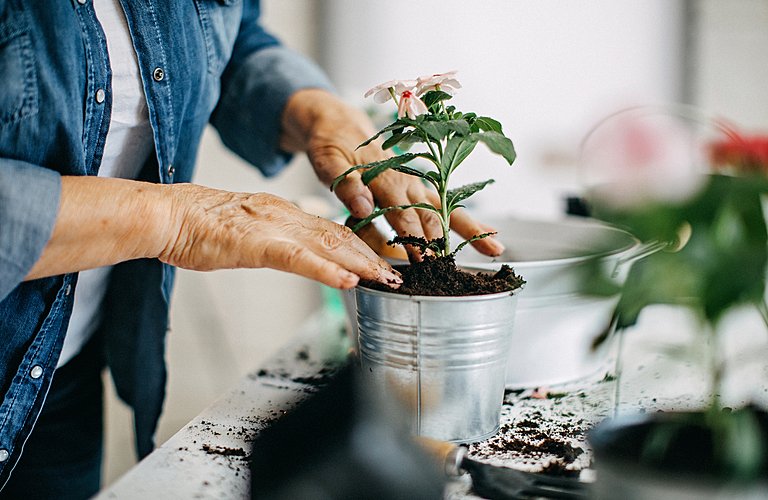192 Sloane Street, London SW1X 9QX

What Are The Stages of Dementia?
Understanding dementia's progression empowers families to make the most of each day whilst preparing thoughtfully for the journey ahead. Though everyone's experience with dementia is unique, recognising common patterns can provide reassurance and help families focus on what matters most - living well together. This article explores dementia's three stages (early, middle and late), offering insights into how families can embrace each phase and how specialist care enhances quality of life throughout the journey.
Each Person's Journey is Unique
Before exploring the stages, it's important to know that dementia affects everyone differently. Factors like the type of dementia, age, general health and lifestyle all play a role in shaping each person's experience. Some people experience many years at each stage, whilst others progress more quickly. The type of dementia influences which abilities are affected first. This variety explains why some people maintain certain skills longer than others - a reminder that dementia doesn't define everything about a person's capabilities.
Early Stage Dementia: A Time for Connection and Planning
In the early stage, individuals begin noticing changes in their daily life. Recognising these signs early creates valuable opportunities - to seek support, make plans, and focus on enjoying life to the fullest. Many people continue living independently for months or years during this stage. People may experience:
- Occasional forgetfulness with recent events
- Misplacing items more often - an opportunity to create helpful organisational systems
- Some confusion with dates, which can be managed with calendars and gentle reminders
Maintaining Communication and Independence
Whilst word-finding might become more difficult, most people continue having meaningful conversations. Simple adaptations, like allowing extra time for responses or using visual cues, help maintain connection. Daily tasks may require more concentration, but with support and patience, people often continue enjoying their usual activities. Getting lost occasionally in familiar places simply means it's time to explore navigation aids or companionship for outings.
Middle Stage Dementia: Embracing Support and New Connections
During the middle stage, additional support enhances wellbeing and opens new possibilities for engagement. Families often discover new ways to connect during this time. Common experiences include:
- Seeking closeness with loved ones, often following family members - a natural desire for reassurance
- Repetition in questions or actions - an opportunity to provide patient, consistent comfort
- Changes in daily rhythms, with some people feeling more alert at different times
Memory changes mean people may live more in the moment - a chance to focus on immediate pleasures rather than complex planning.
Finding New Ways to Communicate
Whilst verbal communication may become more difficult, people often develop other ways to express themselves - through touch, music, art, or facial expressions. People living with middle stage dementia often respond to sensory experiences, familiar music, or simple activities that bring comfort and joy.
Late Stage Dementia: Focusing on Comfort
In late-stage dementia, comprehensive care ensures comfort, dignity and continued moments of joy. With the right support, people living with dementia continue experiencing pleasure through their senses and emotional connections. Whilst verbal communication may be limited, people remain responsive to:
- Gentle touch and physical comfort
- Familiar voices and soothing sounds
- Pleasant aromas and tastes
- Visual beauty in their surroundings
Understanding non-verbal communication helps carers provide responsive, compassionate support that honours each person's needs.
Physical Wellbeing
Changes in mobility and physical needs create opportunities for:
- Therapeutic touch through massage and gentle movement
- Enjoying favourite foods in adapted forms
- Creating comfortable, beautiful environments
- Preventing discomfort through attentive care
Moments of Recognition and Joy
Even when recognition seems uncertain, emotional connections often remain. Many people living with late-stage dementia experience moments of clarity, respond to familiar music, or show pleasure in simple comforts. The essence of who they are continues to shine through.
Living Well at Every Stage
Dementia doesn't diminish a person's worth or capacity for joy. With thoughtful support, people living with dementia continue experiencing moments of happiness and contentment, connection with loved ones, and dignity and respect. Quality specialist care transforms the dementia journey.
Professional carers trained in dementia support create environments where people thrive, maintaining abilities wherever possible whilst adapting creatively to changes. They see beyond the diagnosis to the whole person - their history, preferences, and ongoing capacity for meaningful experiences.
Your Journey, Supported
Whether you're noticing early changes or supporting a loved one through later stages, professional guidance makes all the difference. At KYN, we celebrate each person's unique journey with dementia. Our specialist teams provide exceptional dementia care that honours individuality whilst embracing change with grace.
Through beautiful environments, exceptional care standards, and commitment to enriching daily life, we support residents and families at every stage of their journey. To learn more about how we support people to live well with dementia, enquire today.